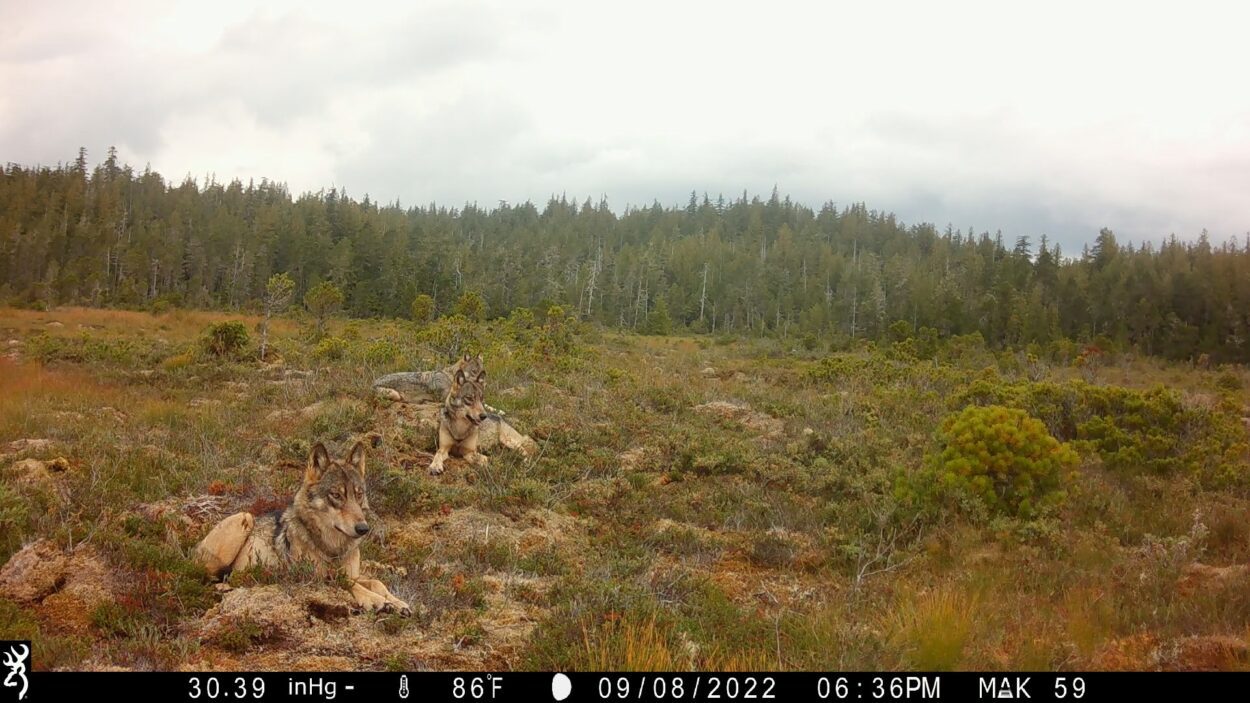
The Alaska Wildlife Alliance submitted nine proposals aimed at protecting wolves for the Board of Game meeting this month.
They all failed. The alliance is one of the groups petitioning to list the wolves on Prince of Wales Island as an endangered species. A list of all the Ketchikan and Prince of Wales Island-area proposals submitted to the board is available here.
Many of the wolf-related proposals on the Board of Game’s agenda last week were submitted by the Alaska Wildlife Alliance. That’s an environmental group that’s had a big hand in trying to add more protections for wolves on Prince of Wales Island.
Carol Damberg is the president of the alliance. She told KRBD her organization was trying to help navigate what’s been a controversial issue: wolf numbers on Prince of Wales.
“Our goal was that we felt that it (the meeting) was an opportunity to provide the state and the folks that are on Prince of Wales some tools to be more precautionary in their management of wolves to make sure that they stay off the endangered species list,” she said.
Still, she was hopeful the board would see the merit of a few of the proposals. One of the proposals asked to shorten the length of time that trappers have to report their kill, from seven days to 48 hours. The Alaska Department of Fish and Game backed that proposal, saying it would help keep accurate and timely data available for biologists.
“And it didn’t work for the folks that were testifying and saying that that was a tough burden to put on them — in terms of safety, as well as the communications out there are sketchy,” she said. “I thought maybe we might see ‘Okay, maybe bump it to three days’ or something like that. But the seven days where it remains.”
Damberg also saw promise in a proposal that aimed to increase the target number of wolves on the island. There are ongoing studies into the topic, and she thought that might be a good reason for the proposal.
“But that was our opportunity to say, well, in the interim, maybe you should raise it up a little bit to be precautionary in your management until you really know the answers that you hope to get in your analysis,” she said.
But several board members said they felt the state was handling the situation well, despite past criticism. That included board member Lyn Keogh.
“By and large, I think they’ve got a pretty good handle on this population,” Keogh said. “And like I said, everything we’ve got going right now is sustainable.”
Members of the public, as well as regional advisory committee members, referenced the proposals throughout two days of public comment.
Bob Jahnke is a member of the Ketchikan advisory committee. His organization opposed every proposal from the Alaska Wildlife Alliance. He said he felt like the proposal showed the organization’s “true colors.”
“We feel this shows the true colors of the Alaska Wildlife Alliance,” he said. “… For one, they are against trapping and hunting of wolves in Southeast, and number two, they have no knowledge of history.”
But in her testimony to the Board of game, Damberg said it’s the opposite.
“Although some folks try to tag us as (an) anti-hunting and anti-trapping organization, we are not that at all,” Damberg said during her testimony. “Many of our members, including myself, enjoy hunting, fishing, hiking, skiing, and all those fun things that happen in Alaska.”
But the board did support a proposal regarding wolves brought forward by Ketchikan’s Fish and Game Advisory Committee. The proposal asked to lengthen the hunting season for wolves. It will now start on Sept. 1, matching the federal season guidelines. Lengthening the season allows more chances to hunt wolves while already in the field, aside from the regular trapping season.
The proposal was supported by the advisory committees in Craig and Klawock, but opposed by the East Prince of Wales group. That’s a big reason why Fairbanks-based member Al Burnette was in support.
“Generally, I’d want to give that extra portion to the trapping or to the trapping season portion for the trappers to have but again, I count you know, four or five AC’s (advisory committees) that are are supporting this and countless are many other individuals and only one AC as opposed to this so I’m gonna I’m gonna lean towards the AC’s,” Burnette explained.
The state’s Department of Fish and Game was neutral on the proposal, explaining that only around 6% of wolves are hunted before trapping season begins, so they weren’t expecting a huge jump in harvest.
Damberg said in the end, she was disappointed but not surprised all of the Alliance proposals failed at the meeting.
“That’s, you know, that’s the way that process works, I guess it’s okay,” she said. “They feel like they are comfortable with what the state’s doing. And anything that we propose was not something they thought was necessary.”
The Board of Game met in Ketchikan Friday through Monday, and discussed more than 50 proposals.
Raegan Miller is a Report for America corps member for KRBD. Your donation to match our RFA grant helps keep her writing stories like this one. Please consider making a tax-deductible contribution at KRBD.org/donate.





